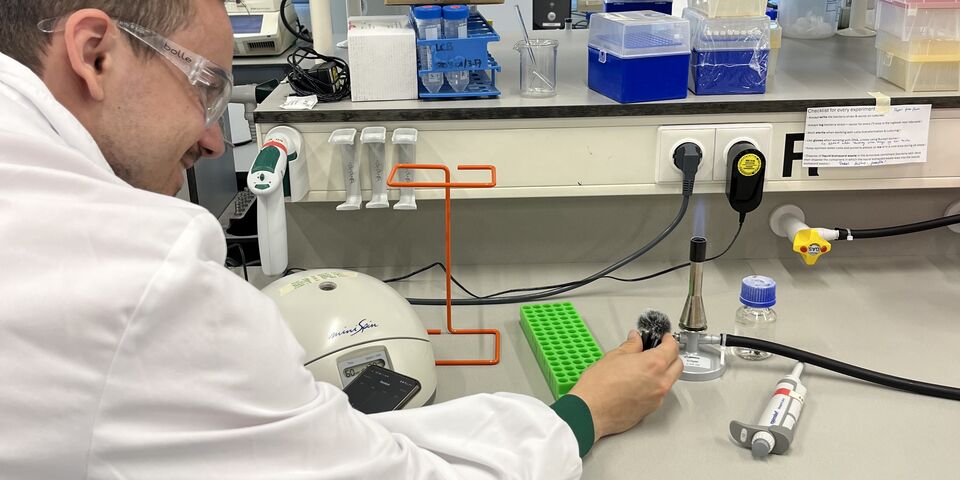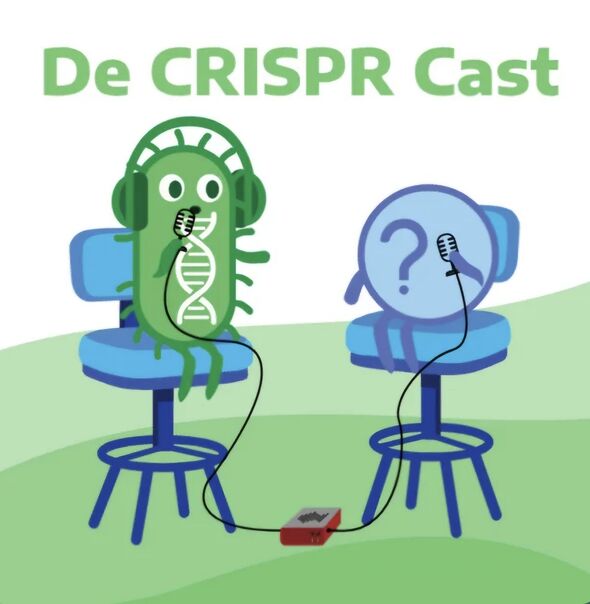From lab to Spotify: students launch 'CRISPR-Cast'
Tessa Krol and Joep Boelen are brimming with pride. As of today, the whole of the Netherlands can listen to the Dutch podcast made by the two TU/e students, both members of the iGEM student team. Don't expect light-hearted chatter, because the episodes are about the methods, applications, and ethical aspects of synthetic biology. Its name? “The CRISPR-Cast. A pun.”
CRISPR-Cas is a groundbreaking technique used in synthetic biology. It can be used to modify the DNA of organisms in a very targeted manner. “The name of our podcast, the CRISPR-Cast, is a play on words based on this method”, Tessa Krol says. She is the voice of the podcast, fellow student Joep Boelen handles the editing.
Krol and Boelen are both master's students on Biomedical Engineering in Professor Maarten Merkx's research group. They are also both members of iGEM, a student team that uses synthetic biology to solve societal problems (see box).
So what exactly is synthetic biology? Krol: “It is a very broad concept, but what we usually say is: modifying biological systems or cells to change their functioning. For instance, consider modifying cells so that they can consume waste plastic.”
Accessible
Part of the iGEM team's tasks is to introduce the public to synthetic biology in an accessible way. “This can be done, for example, by giving guest lectures at schools, but also with this podcast.”
Detecting bile acid diarrhea with molecules that glow and change color
IGEM TU/e is a student team consisting mainly of Biomedical Engineering students. This year there are eight, one of whom is studying Computer Science. They participate in the international iGEM competition, which is organized annually by the American university MIT. The aim of the competition is to use synthetic biology to find a solution to a societal problem of their own choosing, for example in the field of medicine or sustainability.
“This year, we are developing a test for an intestinal disorder called bile acid diarrhea,” Joep Boelen explains. “It is a common cause of irritable bowel syndrome, and patients suffer from chronic diarrhea. Bile acid diarrhea is well treatable, but unfortunately there is currently no affordable and non-invasive test for it. We want to create them using light-emitting and color-changing molecules.” In October, all iGEM teams from around the world will gather together and the winners will be chosen.
What started as a fun idea quickly turned into a serious project: the iGEM members went looking for interesting guests, and Boelen learned how to to work with Adobe Audition and Spotify Creator. As a first-time interviewer, Krol had to overcome a few hurdles. “It takes some getting used to listening to recordings of yourself—at first, it drove me crazy when Joep was editing without headphones on.”
Krol also had to get accustomed to not humming encouragingly while the guest was speaking. Boelen grins when he reminisces about it. “We were recording a very interesting conversation, but I really had to interrupt to point this out to Tessa. Otherwise, I would have had to edit fifty instances of “hmm-mm” from the audio file.”
Biohacker
A total of eight weekly episodes of the CRISPR Cast will be released, in Dutch, each lasting between 30 and 45 minutes. In it, the iGEM members themselves talk about their project, but there will also be guest appearances by former team members, who will discuss how their careers in science and business have progressed since then.
In addition, there are also external guests, such as Groningen biochemist Bert Poolman and ‘biohacker’ Peter Joosten. Boelen: “Joosten, who is also a guest lecturer at TU/e, wrote the book Supermens (Super Human, ed.). He investigates how far people can go to improve themselves in various ways. In doing so, he uses himself as a test subject.”
Also interesting is the conversation with a bioethicist, according to Krol and Boelen. “The conversation touches on, among other things, the case of a Chinese scientist who, according to his own statements and in violation of all international agreements, applied CRISPR-Cas to unborn babies in order to protect them against the HIV virus”, Boelen says.
Guess the Labsound provides a breezy interlude: a section in which each time the students play a different, typical sound from the lab, that they have recorded themselves (as shown in the main photo). What device or material would it be?
Crossbreeding
Developments in synthetic biology often elicit negative reactions from the public: isn't this hazardous? Or unnatural? “During the many practicals in the lab, I experienced that the regulations are extremely strict”, Boelen says. “Furthermore, 99 percent of cells will not survive five seconds outside the lab, so a mutated bacteria cannot simply escape.”
And what about the ethical side? The two like to put that one in perspective. “Don't forget that all the vegetables on our plates have been genetically modified through decades of selective breeding”, Krol says. “And crossbreeding dogs is not natural at all either“, Boelen adds.
Still, Krol doesn't think it is weird that people are anxious about synthetic biology. After all, most people have no idea what goes on in laboratories. “It is important that they can educate themselves about this, and our podcast can help to do just that.“
As of today, the first episode of the CRISPR Cast will be available in Dutch on Spotify.
This article was translated using AI-assisted tools and reviewed by an editor.



Discussion